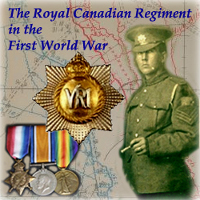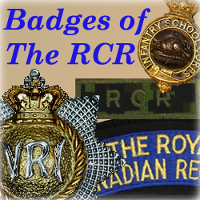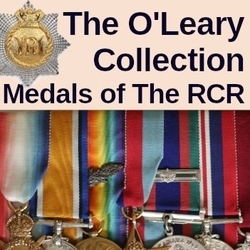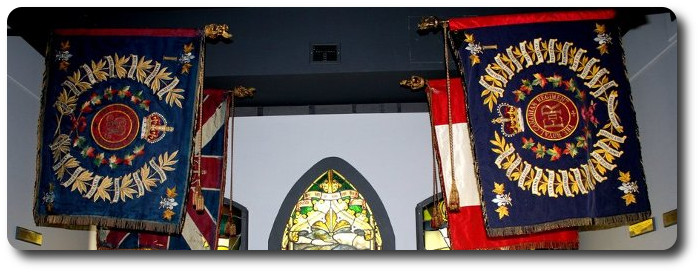
Researching The Royal Canadian Regiment
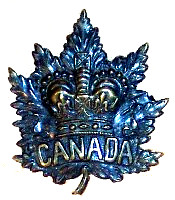
Badge worn by the Second (Special Service) Battalion of The Royal Canadian Regiment while serving in the South African War; 1899-1900.
With The Royal Canadian Regiment in South Africa
"Just a Few High Spots"
By Lieut.-Colonel R. K. Barker, V.D.
The Connecting File, Volume XV, No. 1; February 1936
Toronto, October 12th, 1935.
When recruiting in October, 1899, at the various company depots was completed and the 2nd (Special Service) Battalion, Royal Canadian Regiment, mobilized at Quebec, the Queen's Own Rifles was found to have supplied, from past and present members, Lt.-Col. W. D. Otter, Commanding; the Second in Command, Major Lawrence Buchan; the Officer Commanding "C" Company, Captain R. K. Barker; a large number of N.C.O.'s and men throughout the Battalion; the whole of No.1 Section of "C" Company and a portion of No.3 Section; a very large representation in a unit recruited from all the provinces of Canada.
On October 31st the old S.S. Sardinian sailed from Quebec conveying the first combatant unit ever to leave Canada to take part in a war of the Empire. The voyage out was uneventful, but decidedly uncomfortable through over-crowding and the unsuitable, hurried equipping of the ship. On November 30th the Regiment reached Cape Town Harbor, simultaneously with the 1st Battalion, Gordon Highlanders, with which unit we were soon to be brigaded.
Unfortunately, one death occurred at sea, a member of the Montreal Company, but, beyond some minor ills, the health of the Battalion was excellent.
On the morning after arrival the Regiment entrained "for the front" and was sent north and west to reinforce Methuen's Army on the railway line of communication at the Modder River. Our journey ended at Belmont, where we were held in reserve and where we remained in hard training for some ten weeks.
The monotony was pleasantly interrupted for "C" Company and the Machine Gun Section in late December, and at a time when a series of reverses to General Buller's Army in the east and north and to Lord Methuen's forces at Magersfontein had adversely affected the morale of the Army.
Colonel Pilcher (Bedfordshire Regiment) arrived at Belmont to assemble a small flying column to move to the relief of Douglas, a small town to the west of Belmont infested by rebel Cape Colony Boers.
One company of Canadians and the Machine Gun Section were called for, and "C" Company was selected, as it was, at that time, more advanced in training than the other companies.
On December 31st the column moved in early morning, "C" Company being conveyed in waggons for the first day's journey. Early New Year's morning the column was split, in the hope of surrounding the Boer force, reported to be at Sunnyside Kopje, some few miles out from Douglas. Major De Rougemont, O.C., "P" Battery, R.H.A., commanded our lot, consisting of one section of the Battery, some twenty Munster Fusiliers as mounted scouts, "C" Company and M.G. Section and two companies of the Cornwall Regiment, the latter held back as a support for either half of the column.
We came in sight of the enemy at about 11 a.m. encamped at the foot of the Kopje, and, for once, we saw them first! The first shot by the Battery landed fairly in the Boer's camp, entirely unexpectedly, and those who could get to their horses decamped in a hurry, while the rest took to the hill and opened desultory fire, under which the right half of "C" Company moved forward some three hundred yards to a low-lying ridge, affording very fair cover, and commenced well directed independent fire at 900 yards. They were soon joined by the Machine Guns and No.3 Section, which had been left in support while No. 4 Section remained with the Battery. Colonel Pilcher, who had gone with the other column, arrived upon the scene just as we closed in on the enemy, who surrendered only when we commended the ascent of the hill with fixed bayonets.
We took forty-six prisoners, several mounted, and later found that twelve others had been killed.
We suffered no serious casualties, though Lieut. Adie, Queensland Mounted Rifles, was killed while scouting with the other column. The prisoners were safely guarded over night and the next day Douglas was relieved without further excitement.
On January 4th the little force arrived again at Belmont, very happy and with some valuable experience tucked under their belts. Shortly after this little success, Lord Roberts, with Lord Kitchener as Chief-of-Staff, reached the Cape to take over the whole command, and reorganization of the Army proceeded immediately. The early days of February found General Buller in the northeastern part of the Colony with a reinforced Army, while the main, or northwestern Army, some 33,000 of all ranks apart from lines-of-communication troops, was mobilized about Orange River, Belmont and the Modder, under the personal command of Lord Roberts.
Our Regiment was brigaded under Colonel Smith-Dorrien with the 1st Gordons, the Shropshires and the CornwalIs, to be later known as "The Fighting 19th".
About Febuary 14th a general advance was begun for the ousting of Cronje from Magersfontein and the clearing of the way to the relief of Kimberley.
General French, commanding the mounted division, with General Hutton, who had recently arrived from Canada, commanding a brigade of mounted rifles, moved rapidly to outflank Cronje, who immediately decided to vacate his stronghold and hurry north to the defence of Bloemfontein, the capital of the Orange Free State.
French relieved Kimberley in a hurry, then changed direction north to beat Cronje to the drifts he had to cross at the Modder River, and the main Army simultaneously, though perforce less rapidly followed.
French succeeded in beating the major part of Cronje's Army to the drifts, the principal one being Paardeberg.
The main Army was not many miles away, and by a forced night march, leaving its transport far behind, arrived in time to close Cronje in on all sides.
Our Brigade crossed at Paardeberg drift and, leaving Cornwalls in support, moved to the attack, the Gordons and Shropshires along a ridge of hills on the left and the Canadians over the open veldt adjoining the river bank.
"A" and "C" Companies led, but were stopped within 500 yards of the enemy on a line where all obstacles had been hurriedly range-marked, and we began to suffer our first casualties.
In late afternoon an order to charge reached us and two companies of the Cornwalls advanced to our support. The distance was far too great and the covering fire by the few guns in our rear was of no material help.
The charge fell far short of its objective and cost dearly in lives, though it forced Cronje to draw in his lines by night and enabled the Army to materially reduce the circumference of the circle about him.
Our Regiment in this, the heaviest engagement of the war, lost one hundred and sixteen in killed and wounded. The Cornwalls lost both their C.O. and their Adjutant just before they reached our lines.
The best part of the night was spent by "C" Company in gathering the wounded and conveying them back in some way or other to where the Regiment had retired for much-needed food and rest. Among those who enlisted from the Queen's Own in the list of casualties were Jackson killed, and Kennedy, McGiverin, Rooke, Kidner, Vanderwater and Ward, wounded.
Intermittent fighting, entrenching at night and steadily closing in, occupied the succeeding seven days. During this period very little food was available and our belts were drawn in far beyond the last regular holes.
Under those circumstances, "C" Company was sent hurriedly to establish an outpost some two miles out from the Battalion's lines, as a rumour had spread that DeWet, with his famous "raiders," was attempting to break through to the aid of Cronje. We reached a suitable ridge, after frequent halts through sheer weakness.
When I had completed our distribution, my attention was drawn to some cattle browsing off the foot of the ridge, but I preferred not to see them as I knew the temptation would prove too strong for some of our lot, who had not eaten for full twenty-four hours. Soon I heard a fusilade. A mounted messenger on the way back to Battalion lines also heard it and reported that we were engaged. Major Buchan, with two companies who had had a ration of biscuit issued since our departure, were hurriedly sent out to our support, but the only "support" we needed was now in the pots over "Barny" Bird's (our Company's cook) fires! Shortly Major Buchan appeared, puffing up the hill, and I had to meet him and explain that the cause of the firing was that several mounted men had approached over the veldt, but that they had retired as soon as they learned of our presence.
Major "Larry" had, however, smelt real food and accepted my explanation as sufficient to report back, though he didn't believe a word of it nor did he care. Food was what he wanted, and got it in the shape of excellent broth and stew. When satisfied, he rejoined his troops and, leaving them in blissful ignorance, retired to camp.
About this time a conference of the High Command was held at the Divisional Headquarters of Sir Henry Colville to formulate some means of forcing the surrender of Cronje on "Majuba Day," February 27th, a national holiday in commemoration of the defeat of the British by the same Cronje at Majuba Hill in the prior Boer War.
In face of Lord Roberts' early objection to the suggestion that the Canadians be selected for the task, which he considered would entail very severe casualties, and that therefore regular troops should be risked, Sir Henry Colville's final argument that "if those thousand thieves can't take Cronje they will steal him" settled the matter and we were "elected."
At 2 a.m., in pitch blackness, on February 27th our six Companies moved in on the laager from the advanced trench, front ranks with bayonets fixed, rear ranks with picks and shovels. Absolute quietness was not possible. Cracking twigs, men tripping and occasional "expletives" warned the Boers, so that when within 30 paces a hurricane of lead and fire broke across our front. The four outer companies dropped, one premature shot telling us that we were heard. Twenty three of the Regiment were down for the count and the Companies retired on their trench. But "G" and "H" held on, partly under cover of the river bank. They were soon reinforced and some Engineers with sandbags and tools helped throw up some cover, and at early dawn we were able to enfilade the forward enemy trenches. Cronje was in desperate strait; the whole laager was a wreck, dead men and cattle were scattered about, food was about exhausted, and he had been shelled by field and 4.7 guns for a week. The white flag was raised at daylight, the operations about Paardeberg ceased and Majuba Day was wiped off the slate.
Lord Roberts, later in the day, rode out and personally thanked the Regiment.
The Army was soon on the way to Bloemfontein, and though delayed by major engagements at Abrahams Kraal and Driefontein Kraal, peacefully entered the city a week later.
There the Army was reclothed and we received our first issue of khaki uniforms.
It is worthy of note that on the march from lines of communication to Paardeberg the Army, handicapped by heavy mule and oxen transport, often left far to the rear, covered an average of twenty-four miles per day.
Paardeberg broke the back of the Boer resistance and the relief of Mafeking and Ladysmith shortly followed.
The fever spread rapidly about Bloemfontein, and among the first from the Queen's Own to succumb were Serjt. Bert Beatty and Stacy Blight.
Space will not permit of more than passing comment on the advance on Pretoria, the capital of the Transvaal, and the engagements at Israel's Poort, where Colonel Otter was severely wounded and at Johannesburg, where "Joe" Jordan (Q.O.R.) received one through the left breast.
Pretoria surrendered without defence, and the campaign developed into guerrilla warfare. After a useless chase of DeWet through the Western Transvaal the Regiment was detailed to lines of communication and armoured trains.
"C" Company and half of "E" Company were allotted to me at Olifant's River to protect the railway bridge on the main line to Middleburg and Belfast, where General Buller then was still reasonably busy with the enemy. Here we established a circular line of outposts, connected by patrols, signals and 5-foot megaphones made with the zinc linings of biscuit boxes, and here we had clean water to splash in and drink and, at last, regular food again.
At reveille one happy morn, I awoke to find several bottles of excellent wine and spirits and a quantity of quality cigarettes placed beside my bed-roll. The supply was renewed a few mornings later, and just about that time enquiries passed all down the line to and beyond Pretoria for the location of large consignments of "castor oil" for Buller's headquarters. A visit was even paid our post by the O.C., lines of communication, and after I had noticed some bits of "kindling wood" bearing familiar letters, which if put together could be made to spell "castor" and more, I became more than suspicious. Several days passed before Lieut. Marshall and I discovered the procedure by which the consignments of "medical" comforts failed to reach their lawful destination, and the lid clamped on.
The up-grade to the bridge, the open goods-cars covered only with tarpaulins, and a convenient river below the bridge told it all. A select few of human monkeys would board the up-bound train, duck under the tarpaulins at intervals, and when on the bridge, overboard would go cases of potted meats and sundry other "comforts." A select squad of swimmers would be waiting on the river bank for the passing of the train, when the loot was recovered from the river and quietly stored in an adjacent cavern, carefuIly prepared and camouflaged.
That was organization worthy of the "thousand thieves", even though severe drought was on at Belfast headquarters, an incident referred to in Winston Churchill's story, "A Roving Commission". No one has yet advised him of just how it all happened.
The O.C., communication, a most genial Brig.-General and a namesake, was much interested in our megaphone communication and our defences, but made only passing comment about the missing "castor oil". Much as I would have liked to have offered him a drink, I dared not, though the supply was more than ample.
It was here that we received direct the General Order for return to Canada. Our enlisted year of service had expired, and soon all Companies, except part of "A" and "B", N.C.O.'s and men of the Permanent Corps and those left of the draft from Canada which had joined us in May, entrained for the Cape and sailed via St. Helena and the Cape Verde Islands for Halifax. Two companies, made up of those remaining with Colonel Otter at Erstefabriken, returned some two weeks later via London, where they were royally entertained.
"Tempus Fugit" - and those of us who remain are grouped with the "Sere and Yellow Leaf" of Autumn.
